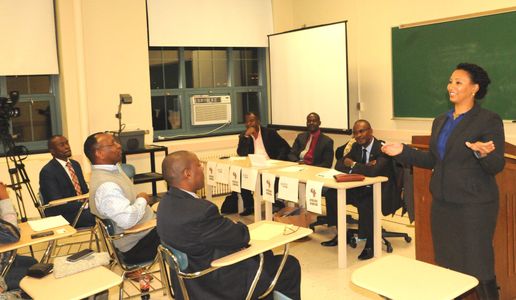ASC Hosts African Diaspora and Governance Symposium
The African Studies Center, an affiliated center of the Frederick S. Pardee School of Global Studies, co-hosted the first ever African Diaspora and Governance Symposium at Boston University on November 5, 2016. The event brought together African diaspora activists from the greater Boston area to discuss the issues of diaspora organizing and networking for effective participation in governance and political life.
The Symposium, co-hosted with Africans in Boston, featured Dr. Sylvester Okere, President of the United People for African Congress (UPAC), and Attorney Candice McKinley, the Vice-President of UPAC and a civil rights and education attorney.
Okere stated that the community of African immigrants is one of the most educated, dynamic and diverse communities in the United States.
“We have the people, talents, skills, experience, values and unique culture that distinguish us,” Okere said. “Let’s come together and change the narratives that have been dragging us down. In order for the ethnic African community in the United States to become relevant and be fully integrated into the American political system, we must first be organized.”
Okere called for ethnic Africans in the U.S. to overcome the scars of colonialism, discrimination, and marginalization, and work towards creating solidarity to transform the local immigrant communities as well as those of the African motherland. Okere was the first immigrant to fill Africa’s seat of the National Democratic Party to represent the African diaspora, and first African immigrant to speak on a national platform on the 50th anniversary of Martin Luther King, Jr. at the Lincoln Memorial.
Attorney Candice D. McKinley, an African American attorney, political strategist and gender activist, urged African immigrants to understand their heritage, and to be selfless, purposeful, and intentional in their struggle to unite the diaspora to achieve their dreams.
“I come from down South where we had the same issues of mistrust among different African American groups from different regions, but we managed to overcome these and now speak with one voice,” said the young mother and former teacher who spent time in Tanzania working for women empowerment and Rwanda genocide cases.
“Women must know their worth, purpose in the world, and intend to be change agents,” McKinley said. “Society has engrained in men to be leaders rather than women. While women currently make up 51% of the American population, we are still not seen as an equal to men. Including and encouraging women to be at the political table would help to garner systemic change that will benefit future generations.”
The ethnic African organization UPAC is a non-segmented body committed to mobilizing the estimated 3 million African immigrants in the United States for empowered participation in the social and political lives of the communities in the U.S. as well as for the development of their motherland. The organization serves all ethnic Africans in the diaspora. Recent initiatives include the struggle to involve African immigrants in relevant high level policy discussions, such as the African Growth and Opportunity Act, as well as engaging their active participation in the 2016 presidential elections.
Voury Ignegongba, President of Africans in Boston and convener of the event, said that he was overjoyed by dozens of African immigrants from different African countries living in Boston who attended the symposium, demonstrating that Africans have the desire to put their differences aside and unify for a common cause while far from their homelands. Africans in Boston is an organization that fosters the socio-economic and educational development of its members by offering a platform that connects the African diaspora in the greater Boston area and in the state of Massachusetts.
“It is very refreshing and encouraging to see a group of African immigrants come together here today in search of better lives,” said Harrison Maina, a Boston University Metropolitan College student from Kenya. “Since UPAC has taken the lead to organize the highly disjointed and scattered African communities in the diaspora, it is up to us to join in and render our talents and skills. Let all African community organizations that are genuine about their intent to make Africans more united and respected now consider joining UPAC.”
These comments were echoed by several other attendees of the symposium, who included Geoffrey Nsereko of Radio Uganda Boston, Pastor Isaac Balinda of Uganda, Rev. Christine Nakyeyune of the Ugandan Anglican church in Waltham, Chioma Nnaji of Africans for Improved Access, and Dorothy Sebbaka of Women of Purpose International.
“In the present era of ever-growing migration and mobility, diaspora contributions to the development of their countries of origin are crucial,” said Daivi Rodima-Taylor of BU ASC Diaspora Studies Initiative. “We are proud to contribute to creating a forum for local African diaspora communities to discuss strategies for productive diaspora engagement and empowerment.”
The Diaspora Studies Initiative at the African Studies Center of the Pardee School of Global Studies explores the dynamics of transnational diaspora networks and communities. Activities focus on diaspora organization and networking, its economic, social and cultural contributions in the form of individual and collective remittances, diaspora investment and entrepreneurship, and the formation of new transnational identities, institutions, and knowledge systems. The initiative aims to provide a facilitating forum for diverse diaspora groups and networks to exchange experiences and strategy in effective diaspora engagement.
Another upcoming event is a Dec. 7 workshop “Networking, Philanthropy and Fundraising: How to Build Meaningful Relationships for You and Your Organization,” facilitated by Diaspora Matters, a global consultancy and training firm based out of Dublin, Ireland. Click here for more information and to register for the event.
